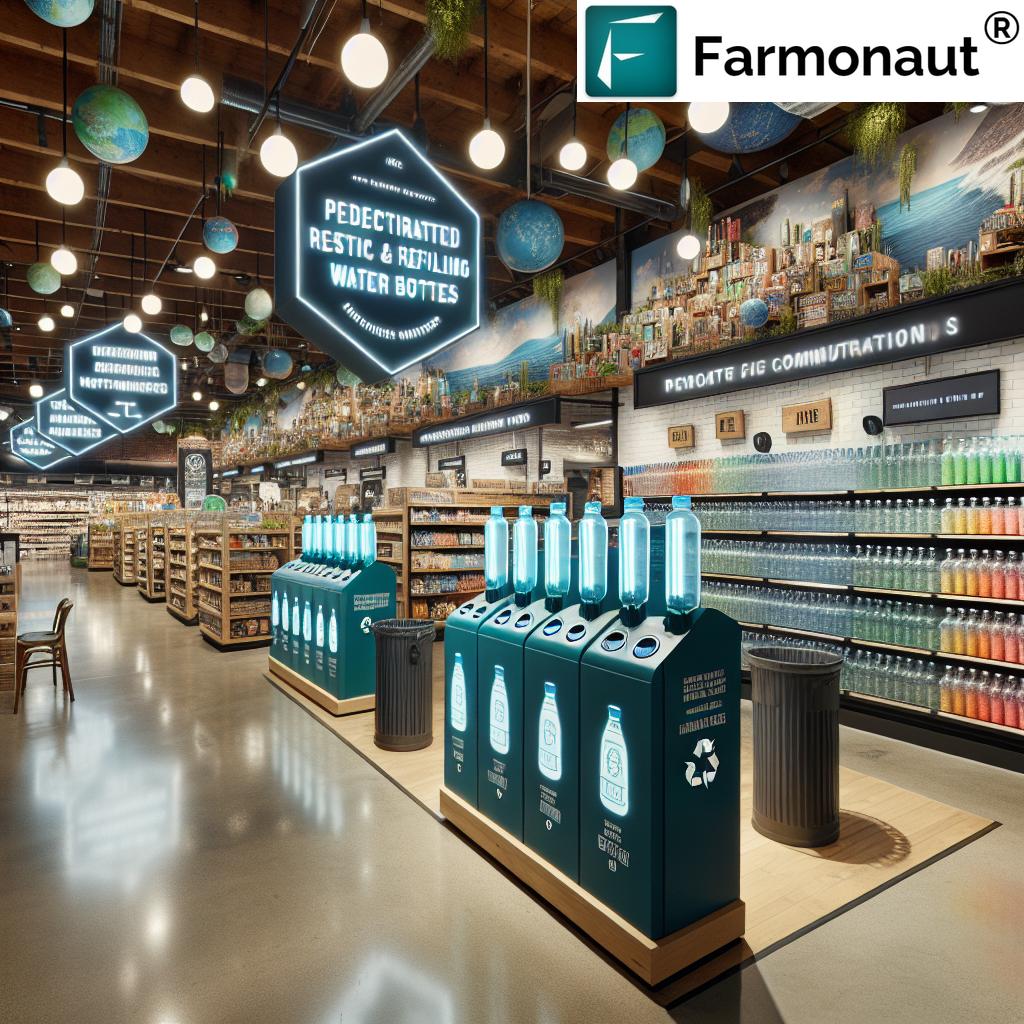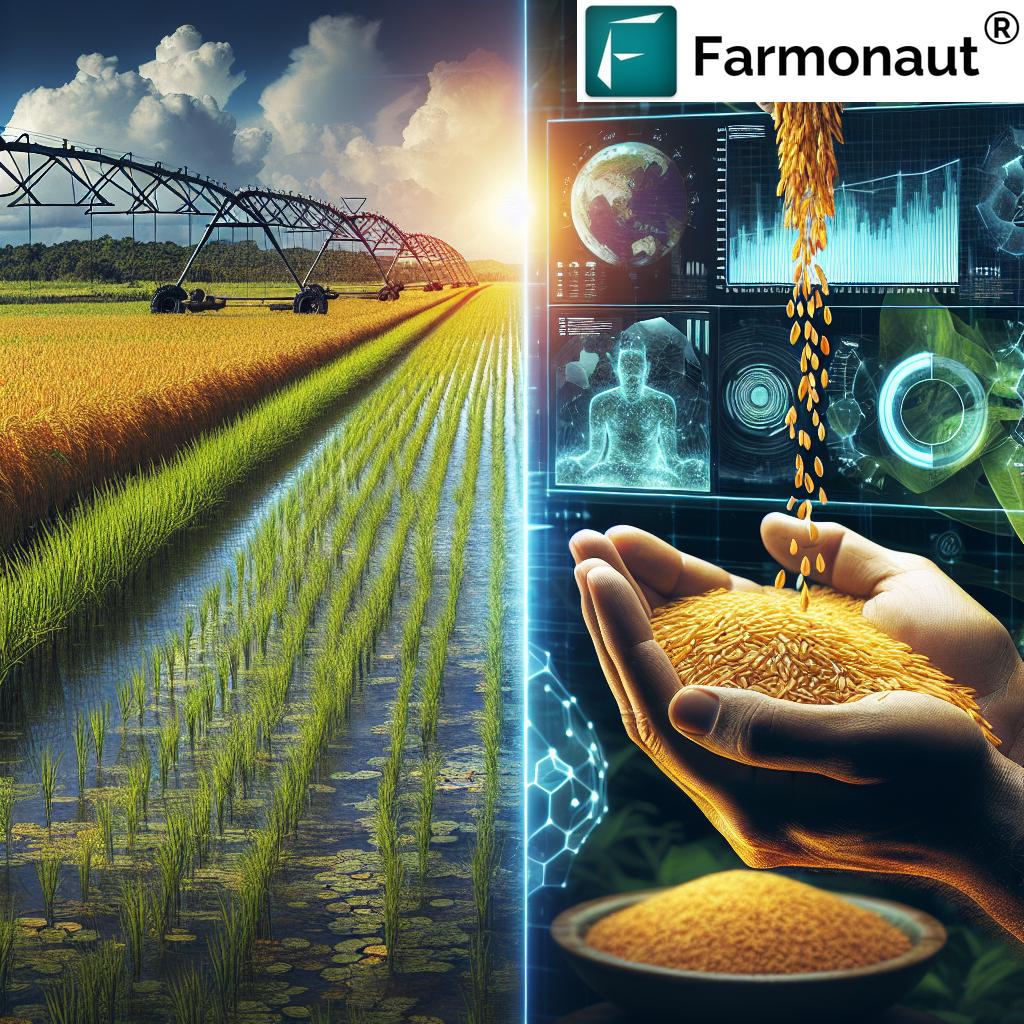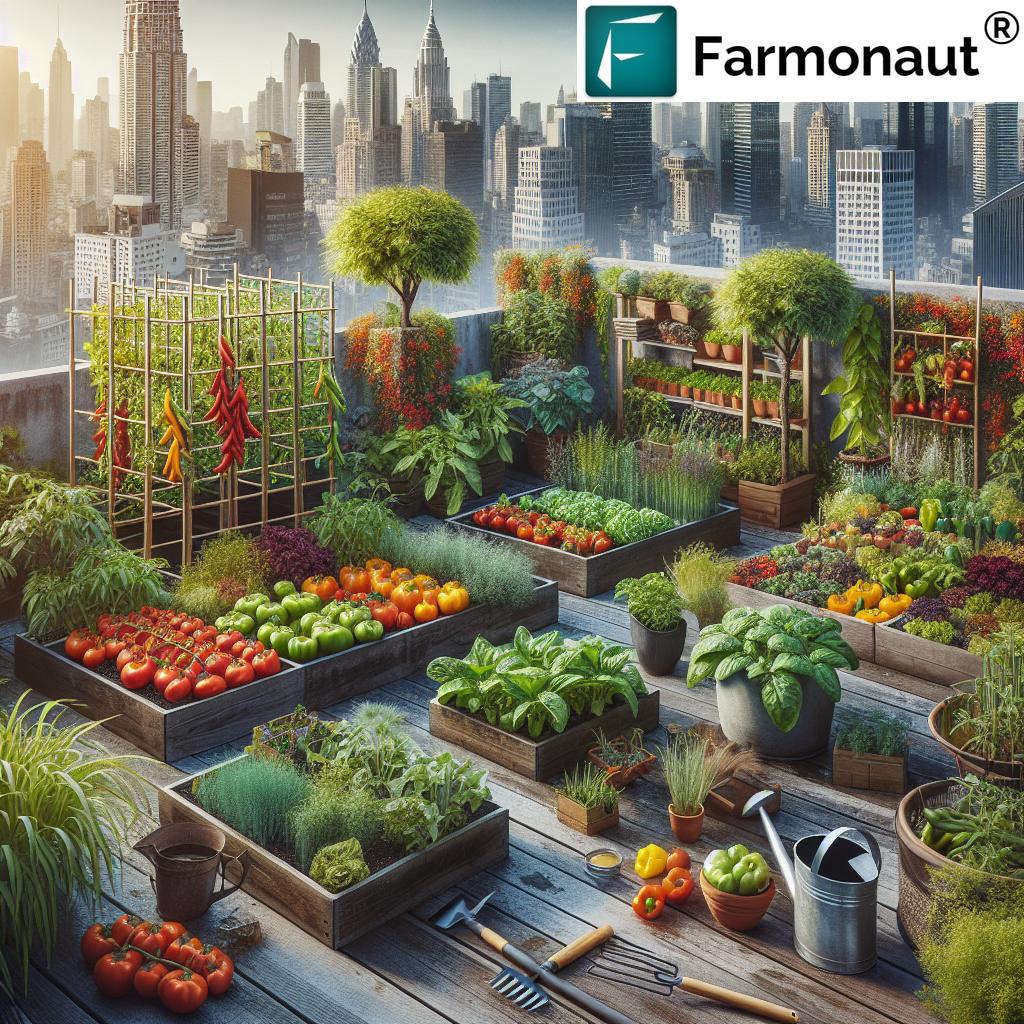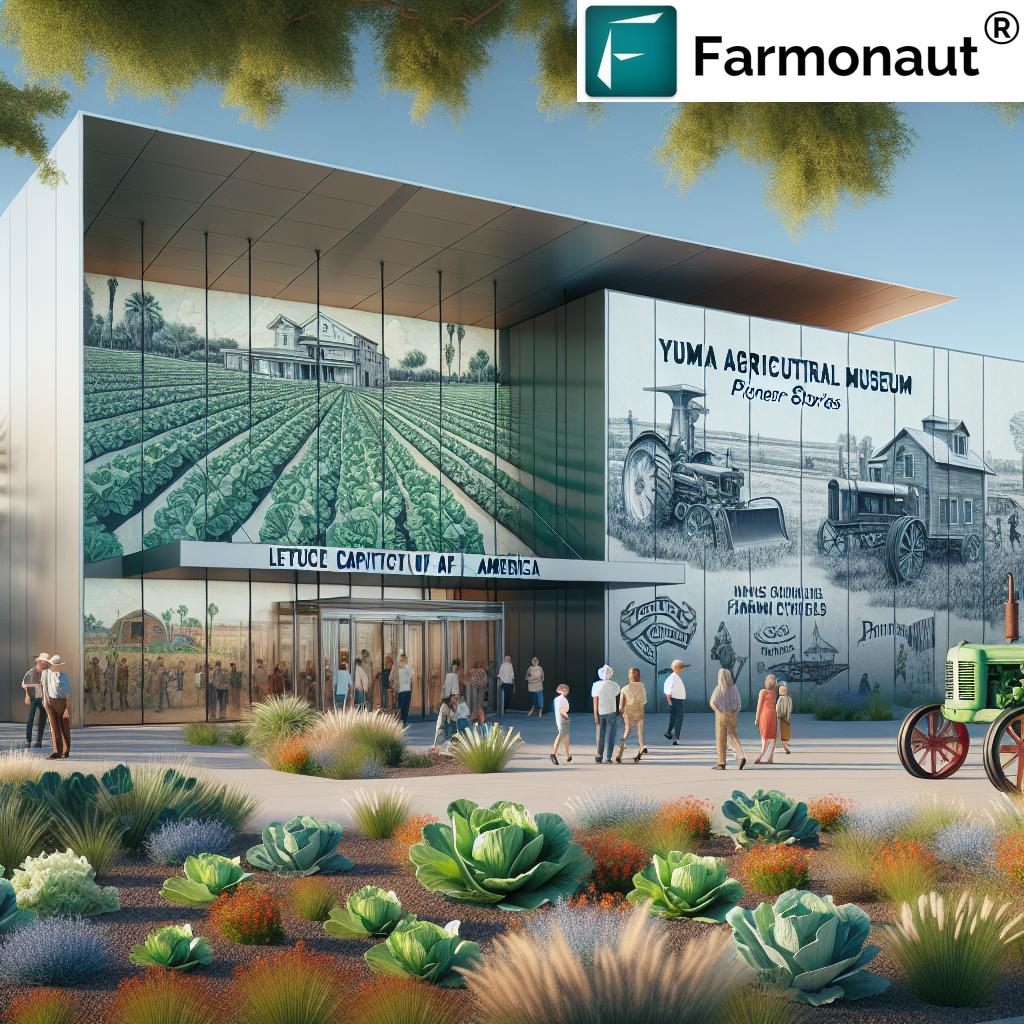Ocean Plastic Cleanup: 5 Powerful Ways Boosting Los Angeles Waterways
Table of Contents
- Introduction: Why Ocean Plastic Cleanup Matters in Los Angeles
- Circular Economy & Sustainable Water Solutions: Our Approach
- 5 Powerful Ocean Plastic Cleanup Methods Helping Los Angeles Waterways
- Impact of Ocean Plastic Cleanup Methods in Los Angeles Waterways
- Championing Hydration & Sustainability Through Innovative Packaging
- How Cleaner Waterways Enhance Community Hydration & Ecosystems
- Advancing Circular Economy Initiatives in Los Angeles and Beyond
- Enhancing Environmental Stewardship with Farmonaut Digital Solutions
- Ocean Plastic Cleanup: FAQ
- Conclusion: A Cleaner, Healthier Future for Los Angeles’s Waterways
Introduction: Why Ocean Plastic Cleanup Matters in Los Angeles
Plastic pollution in oceans and rivers poses a profound threat to our environment, communities, and health. The city of Los Angeles and its surrounding county play a crucial role in the global fight against plastic waste. As one of America’s major coastal metropolises, Los Angeles is both a contributor to, and a victim of, marine debris. From Ballona Creek to the Pacific coastline, our waterways act as conduits, carrying plastic pollution from local sources into the wider oceans.
Recognizing the urgency for action, we are committed to implementing ocean plastic cleanup and sustainable water solutions that drive true impact for our environment, economy, and social well-being. Here, we’ll explore 5 powerful cleanup methods boosting the quality of Los Angeles waterways – with a special focus on the intersection of circular economy initiatives, innovative packaging materials, and community hydration solutions.
Circular Economy & Sustainable Water Solutions: Our Approach
At the core of effective ocean plastic cleanup is a circular economy mindset. Rather than relying on single-use products and linear consumption, we embrace models that keep materials – especially plastics – in circulation via reuse, recycling, and refill programs. Our vision is clear: to reduce waste, drive resource efficiency, and create enduring benefits for local communities and ecosystems across Los Angeles County.
With this approach, community hydration solutions are interconnected with our cleanup and sustainability goals. From reusable water bottles and innovative packaging to recycling and refill programs, sustainable water management drives not only environmental impact but also supports equitable access to clean water.
5 Powerful Ocean Plastic Cleanup Methods Helping Los Angeles Waterways
Let’s explore how Los Angeles leverages cutting-edge technologies, community-driven initiatives, and robust systems to combat plastic in our rivers and oceans. These five methods combine international best practices with locally adapted solutions, fueling our sustainability and circular economy journey.
1. River Interceptors: Stopping Plastic at the Source
River Interceptors are sophisticated floating systems designed to halt and collect plastic waste before it enters the ocean. By extracting debris from rivers like Ballona Creek in Los Angeles County, these innovative solutions disrupt the plastic pathway, safeguard ecosystems, and protect marine life.
Key advantages include high efficiency, minimal labor requirements, and scalability.
Why it matters: Every kilogram intercepted upstream means less pollution in our beaches and the wider oceans.
- Automated conveyor belts sort debris
- Solar-powered operations for sustainability
- Facilitates downstream recycling and circular economy
2. Ocean Skimmers: Removing Plastics from Open Water
Ocean skimmers are boat-like vessels equipped with nets and conveyors that skim plastic from the surface of harbors and coastal waters. Especially valuable along busy Los Angeles marinas and beaches, these systems capture visible debris and contribute to cleaner waterways projects.
Ocean skimming bridges the gap between interception in rivers and full ocean-scale cleanup, making it a versatile method within regional network of solutions.
- Rapid deployment for response to pollution events
- Collected plastics can be routed to recycling programs
- High visual impact fosters community support
3. Community Cleanups: Mobilizing Residents for Impact
No plastic cleanup effort succeeds without the enthusiastic involvement of local communities. In Los Angeles and California, organized “cleanup days” rally volunteers to remove plastic and other waste from parks, rivers, and coastlines.
Paired with education and awareness campaigns, these events drive lasting cultural change and reinforce the importance of reducing plastic waste at its source.
- Participation fosters pride and stewardship in Los Angeles communities
- Cleanup data supports local policy and infrastructure improvements
- Helps shift consumer habits toward reuse and refill
4. Biodegradable Barriers: New Materials for Pollution Control
Instead of traditional synthetic booms, biodegradable barriers represent a new frontier in plastic pollution management. These barriers can corral floating debris without adding microplastics or harming wildlife.
Developed from renewable materials and engineered for endurance, they complement river and ocean cleanup systems while aligning with California’s push for innovative packaging and greener cities.
- Reduces risk of secondary contamination
- Ensures harmony with delicate aquatic ecosystems
- Breaks down harmlessly, supporting a healthier environment
5. AI-Powered Drones: High-Tech Surveillance and Removal
The integration of AI and drones in plastic pollution in oceans management marks an exciting new chapter for Los Angeles County. These drones detect floating waste, monitor waterways in real time, and even aid in collecting hard-to-reach debris.
- Enhanced data collection for targeted interventions
- Enables rapid identification and mapping of pollution “hot spots”
- Minimizes labor while maximizing impact
Impact of Ocean Plastic Cleanup Methods in Los Angeles Waterways
| Cleanup Method | Estimated Plastic Removed per Year (tons) | Community Engagement Level | Contribution to Circular Economy | Notable Sustainability Benefits |
|---|---|---|---|---|
| River Interceptors | 1,000+ | Medium | Yes | Reduces ocean pollution, enables upstream recycling, scalable technology |
| Ocean Skimmers | 200–350 | Low | Yes | Immediate removal, supports marine ecosystems, visible community impact |
| Community Cleanups | 350–500 | High | Yes | Mobilizes local residents, fosters stewardship, enhances awareness |
| Biodegradable Barriers | 150–250 | Medium | Yes | Eco-friendly, prevents microplastic generation, safe for wildlife |
| AI-Powered Drones | 90–120 | Medium | Yes | Precision targeting of hotspots, scalable surveillance, data-driven |
Championing Hydration & Sustainability Through Innovative Packaging
Promoting community hydration solutions in California goes hand-in-hand with tackling plastic waste. One of the most impactful approaches is the widespread adoption of reusable water bottles, multi-serve bottles, and innovative packaging materials. Here’s how circular packaging models are transforming the way we deliver hydration in Los Angeles and across America:
- Designing for Reuse: Multi-use, durable bottles limit the need for single-use waste and provide cost-effective hydration for homes and businesses.
- Refill and Recycling Programs: Easily accessible refill stations and bottle exchange outlets at retail locations and via direct delivery keep materials in circulation and promote consumer participation.
- Innovative Materials: Using recycled plastic, aluminum, or glass minimizes resource extraction, supports recycling infrastructure, and closes the loop for circular economy initiatives.
- Zero Waste Manufacturing: Striving toward zero landfill waste in manufacturing processes ensures resource efficiency and environmental protection.
- Education & Community Engagement: Ongoing outreach and cleanup events empower consumers to understand, embrace, and champion sustainable water solutions themselves.
By re-imagining packaging for reuse and sustainability, we not only reduce environmental impact but also set new standards for quality and responsible hydration delivery to Los Angeles, North America, and Canada.
Manage your environmental and agricultural initiatives smarter with Farmonaut’s Large Scale Farm Management App – intuitively track and optimize resources for enhanced sustainability at your fingertips!
How Cleaner Waterways Enhance Community Hydration & Ecosystems
Implementing ocean plastic cleanup methods and promoting sustainable water solutions generate tangible benefits across communities and ecosystems:
- Healthier Drinking Water: Removing plastic contamination from the supply chain ensures safer, higher quality hydration for residents and businesses.
- Stronger Ecosystems: Cleaner rivers and oceans protect biodiversity – from local fish populations to migratory birds along the Los Angeles shore.
- Accessible Hydration: Expanded refill networks and direct-to-home delivery ensure clean water is available anytime, anywhere – vital in urban and underserved areas.
- Community Resilience: Water security built on circular systems supports Los Angeles in facing climate change, drought, or unexpected disruptions.
- Economic Opportunities: Driving a circular economy in packaging and cleanups translates into new jobs, skills training, and business innovations throughout the region.
- Reduction of Waste to Landfill: Reusable and recyclable packaging methods divert large volumes of plastic from landfill, safeguarding the local environment for future generations.
Advancing Circular Economy Initiatives in Los Angeles and Beyond
The journey toward circular economy initiatives in Los Angeles County is powered by a range of integrated systems and local participation:
- Multi-Serve & Refill Bottle Networks: With over 26,000 U.S. retail exchange outlets and 23,500+ refill stations, consumers actively reduce the use of single-use plastics by choosing refill and reuse options. Learn how refill and fleet management tools make sustainable bottle logistics efficient for any scale, via home delivery and retail exchange systems.
- Responsible Sourcing & Recycling: Circular methods emphasize responsible sourcing of materials – from recycled plastics to renewable glass and aluminum. Closed-loop recycling programs convert ocean- and river-derived plastics into new products, supporting both environmental and economic goals.
- Community-Centric Hydration Solutions: Direct-to-home and business hydration solutions with robust reuse and refill cycles deliver both convenience and reduced environmental impact – a model now emulated across North America and Canada.
- Traceability & Data Management: Advanced digital platforms, such as blockchain-based traceability solutions, ensure every stage of bottle, packaging, or hydration product journey is transparent, secure, and certified for sustainability. This visibility enhances consumer trust and regulatory compliance.
- Zero-Waste Manufacturing: Circular economy leaders aim to achieve zero waste to landfill status, deploying waste minimization strategies within all levels of packaging manufacturing and logistics.
- Carbon Footprint Reduction: Programs like Farmonaut’s Carbon Footprinting equip agribusinesses and water solution providers with real-time data to monitor, verify, and cut CO2 emissions from resource use, logistics, and packaging operations.
Developers and water managers, power up your sustainability projects with Farmonaut’s comprehensive Satellite & Weather API for scalable integration.
Check the latest API Developer Docs for rapid deployment and seamless connectivity with your cleanup and traceability applications.
Enhancing Environmental Stewardship with Farmonaut Digital Solutions
Advancing a truly sustainable water solution and circular economy in California – and around the globe – requires digital tools that can monitor, verify, and optimize every stage of the process.
Farmonaut is at the forefront of this movement as a leader in agricultural technology and environmental data management. Here’s how Farmonaut’s technology aligns with ocean plastic cleanup and beyond:
- Satellite-Based Monitoring: Multispectral images support real-time assessment of crop and water quality, river health, and even plastic accumulation hotspots.
- AI-Powered Advisory: The Jeevn AI system empowers users with predictive analytics, supporting decisions for water and plastic waste reductions on farms and riverbank communities.
- Blockchain-Based Traceability: Full supply chain transparency, verified through secure and immutable records, reinforces circular packaging and product reuse across the hydration industry. Deep dive into robust traceability technology now available for tracking environmental and agricultural products from source to consumer.
- Resource & Fleet Management: Optimize logistics, water delivery, and rapid maturation of community refill networks with fleet management solutions, helping to lower emissions and boost operational efficiency.
- Carbon Footprinting: Meet your emissions reduction goals and regulatory mandates using carbon footprinting tools that support sustainable action across all verticals.
- Access via App, Web & API: Farmonaut apps for Android, iOS, and Web put advanced environmental management tools in the palms of farmers, hydrologists, and business leaders everywhere.
Farmonaut empowers not only individual farmers and agribusinesses but also government agencies, NGOs, corporate supply chains, and local communities—increasing efficiency, maximizing sustainability, and securing a brighter future for Los Angeles, North America, and the world.
Ocean Plastic Cleanup: FAQ
What is the purpose of ocean plastic cleanup in Los Angeles?
Ocean plastic cleanup aims to remove plastic and other debris from local rivers, creeks, and coastal waters. By doing so, we prevent pollution from reaching larger oceans, protect marine life, and enhance community health. These efforts are vital for supporting the circular economy and ensuring sustainable hydration access across Los Angeles County.
How do reusable water bottles help reduce plastic waste?
Reusable water bottles are central to a circular packaging model. With every refill or exchange, consumers help keep high-quality hydration materials in circulation. This reduces the use of single-use plastics, diverts waste from landfill, and contributes to a cleaner environment for local communities and future generations.
What are some community-led initiatives for ocean plastic cleanup?
Community cleanups are highly effective in engaging local residents to remove plastic waste and raise awareness. These events, often supported by regional businesses and environmental groups, drive real impact and foster a culture of environmental stewardship across Los Angeles and California’s coastal cities.
How does circular economy benefit hydration and packaging industries?
Circular economy models promote recycling, reuse, and responsible sourcing of materials. This minimizes resource consumption, lowers landfill waste, and supports sustainable growth across the hydration, retail, and packaging sectors—directly benefiting both business and community.
How can digital solutions enhance plastic cleanup and sustainability?
Solutions like Farmonaut’s carbon footprinting, blockchain traceability, and large-scale farm management tools make it possible to monitor, optimize, and verify every step of the process. Data-driven insights, satellite monitoring, and resource management tools empower businesses, communities, and institutions to maximize their environmental impact and sustainability outcomes.
How can I get involved in ocean plastic cleanup efforts?
Join local community cleanup days, choose refillable hydration solutions, and adopt circular packaging in your daily life. Stay informed about local, regional, and international sustainability projects—together, we can build cleaner, healthier waterways for Los Angeles, North America, Canada, and beyond.
Conclusion: A Cleaner, Healthier Future for Los Angeles’s Waterways
The ongoing challenge of plastic pollution in oceans and rivers calls for collaborative, data-driven, and scalable action. By integrating ocean plastic cleanup, circular economy initiatives, and community hydration solutions, Los Angeles is forging a path towards cleaner waterways, thriving ecosystems, and a healthier society.
Digital solutions, intelligent packaging, and engaged communities are at the heart of this transformation. As we continue to innovate, monitor, and adapt, Los Angeles will remain at the forefront of sustainable water management and environmental stewardship across local and global landscapes.
To contribute, adopt, or learn more about scalable sustainability solutions, connect with Farmonaut and explore how technology can amplify your impact. Together, we can secure a cleaner, more resilient future for our water, our land, and our communities.


















